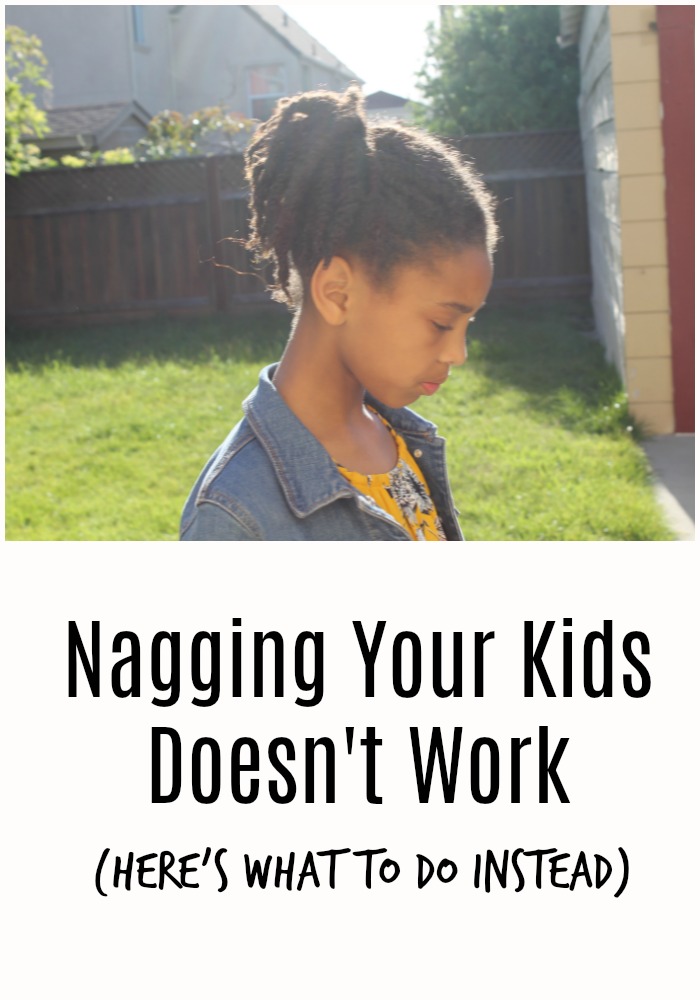
Not too long ago, I read an article that said something about daughters with nagging mothers did better in life.
Okay, to be honest, I didn’t read the article.
I saw the headline and immediately started celebrating my obviously amazing parenting skills. If the headline was true, then my daughter was set. Her future was looking really bright!
You’re welcome.
At 9-years-old, Ayva is at the critical learning stage where there are life lessons to be had in just about every situation.
I try to take advantage of that and coach her, in the moment, about how she can improve.
Everything from her habit of being distracted to her eating habits (sweets, lots of sweets) is open to critique.
I understand how powerful words and tone are when it comes to raising a child, and I always strive to speak life into her.
Sometimes, though, it ain’t all that.
I’m just nagging. Pure and simple.
Lately, I’ve been hearing myself and quite frankly, I’m getting on my own damn nerves!
It’s not hard to fall into the pattern of being a nag.
Kids are kids.
They’re unpredictable because their brains are still maturing.
One day they might be the most obedient, thoughtful, and reflective child in the world. The next day they’re mouthy, moody, and getting on our last nerve.
There might be periods of time where it feels like there’s no balance between correcting and celebrating them.
You know what?
We need to find the balance.
As parents, our job is absolutely to make sure our children grow up to be responsible adults.
We’re also supposed to be instilling a sense of self-worth, giving them a safe space to learn, and building them up so that they go out into the world knowing that they can do anything they work hard to do.
Nagging ain’t the way to do that.
What having adults nag me as a child did for me was make me become an adult whose main concern was making sure other folks were happy.
I don’t mean in the Christian, “God first, others second, me third” type sense.
I’m talking about letting folks run over me because I was a people pleaser. I didn’t want to upset anyone, or disappoint them.
Nagging also made me second guess stuff. A lot of the nagging I received wasn’t even helpful.
Why do we always have to tell you to XYZ?
I keep telling you to XYZ!
Do this. Do that.
Kids don’t come into the room knowing how to keep their bedroom clean.
They aren’t slow in the morning before school because they just don’t care and they want to make us late.
Forgetting their homework at school multiple times isn’t an action that they’re doing on purpose.
Just like adults sometimes need strategies and support to do the things we should know how to do like budgeting, meal planning, or even being productive, kids need that, too.
Usually, when we’re nagging, we’re not even offering constructive information that will help them to do what we’re nagging them about doing better.
It’s not instructional or useful.
We’re just voicing our frustration.
Can you imagine if your boss nagged you about the thing at work that you’re struggling with like you nag your kids?
Or if your girlfriends got on you all the time because you were buying takeout for dinner again?
You’d probably start shutting down, looking for a new job, and not confiding in your friend anymore.
A lot of parents say they want their kids to talk to them. I know I do.
I want my daughter to be open and feel like she can tell me anything.
Fortunately, she does right now, but if I want to continue that in the future, I know I can’t create a relationship where she’s always trying to dodge me because all I do is nag.
So, I’ve dialed it back. Before I start correcting, I ask myself is this is a critical life skill that Ayva needs to have, or am I just being particular.
I also look at whether I can wait to coach her about something.
Can I roll it into another conversation rather than nagging at every singular issue?
Surprisingly, the answer to both those questions is usually yes.
Nagging less isn’t an easy feat.
I feel like when I became a mom that switch just turned on.
Nobody really tells you that you have to calibrate that feature, though.
It can’t just be on, full power, all the time.
Yes, I want my daughter to be successful, but I’m sure there are other things I can do to get her there than for me to nag her way to the top.
But now, what am I going to do with all of this free time?
Other posts you might like:
The trick to getting your daughter to tell you everything
100 ways to connect with your tween daughter
5 ways to build trust with your tween daughter

Great post!! My son is only 3 1/2 and at the age he is starting to be more independent. I definitely see me starting to nag him more and have to rethink how to talk through things with him.